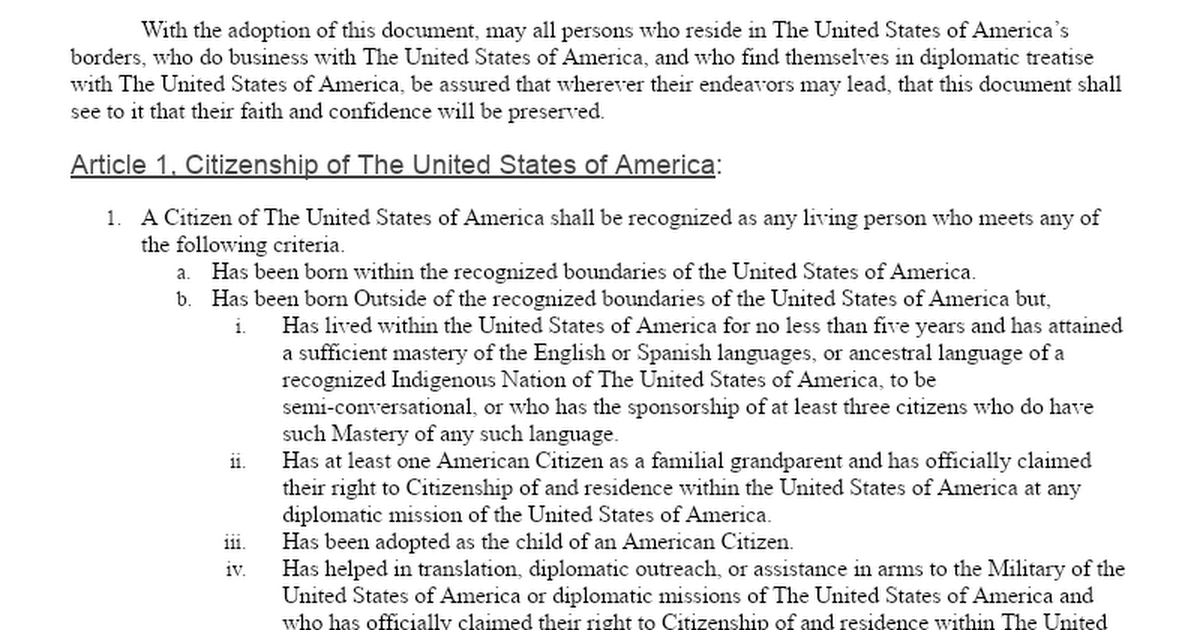A big theme I feel this version addresses is (well earned IMO) mistrust in the government and justice system.
I believe multi-seat STAR and sortitionate judiciary benches will go a decent way towards as many people feeling like electoral outcomes are fair and that they have at least one representative they feel they can trust as a confidant as possible, and that as many people can trust that federal cases are being tried without any judicial activism playing into seating and jurisdiction selection.
I also believe a dual-parliamentary system will go a long way towards removing the “do or die” feelings towards each election since now there isn’t a single big boss at the top who can wildly swerve the direction of the nation based on the whims of whichever camp was more dissuaded from turning out that cycle.
Wouldn’t call that crazy exactly. More like the way the system was supposed to work. It was never supposed to be an immortal document that lasted hundreds of years. It was always supposed to be amended constantly to keep up with the needs of the nation. We just failed
The language requirement is useless. Why enshrine any language over others? We’re a nation of immigrants. Nobody on this continent originated on this continent, and the U.S. in particular has had waves of immigration from around the world. Tying citizenship to language mastery of only first nations languages, English, and Spanish is silly, and vaguely racist.
Why not German too? Massive amounts of German immigrants here. French is still in place names all over the country, and big parts were originally taken over by the French, just as much as the Spanish and English.
It’s ignoring the contribution of Chinese workers entirely.
And, most important, there’s not a single African language mentioned at all that I could see, and you’d be hard pressed to find any other diaspora that contributed as much to the success of the U.S. as a nation as the African diaspora. I’d argue that there isn’t a single other group that contributed as much. Why not their historic languages too?
It’s a very eurocentric selection that pretends concern about the people that got here first.
Edit: I did read it all, and the rest is full of similar poorly thought out and poorly phrased items. It would offer no improvement over the current constitution, and would only serve to reset a lot of arguments that have already been worked out. I just used that first one as an exogenous example of the weak thinking that went into it.
Those other languages aren’t mentioned because not being able to speak them doesn’t hinder your ability to navigate society outside of state accomodation, the reason the indigenous languages got the nod is because they’re the only other group of languages where being able to speak one can allow you a decent level of social navigability in at least some parts of the country that you wouldn’t have with any other.
And it’s not even a full requirement either since being sponsored by 3 folks who are proficient works just as well.
Historical contribution or official language status ambitions has nothing to do with the choices, it’s about being able to support yourself or having established roots who can support you within the community you’re moving to.
Like I’m generally against assimilationist sentiments but I don’t think it’s unreasonable to expect people who intend to live somewhere on a permanent basis either be able to speak to the broad swath of folks they’re going to run into on a daily basis, or have an established community there to help them navigate not being able to do that.
As for no material improvements, I’d argue that more or less abolishing the duopoly and significantly expanding power to lower social classes by sheer number of open posts would do a significant amount towards improving quite a lot about how Americans interact with their republic.
Only reason I could see someone disagreeing is if they’re the sort who believes the senate existing at all is a problem, which is basically a direct challenge to the federal model of state as a concept and a deeply concerning sentiment, or if they’re the sort who believes that the supreme court as an institution still existing is a problem, which, bruh.
Social navigation has no business in the American constitution, period.
You’re talking about rebuilding the constitution from the ground up, and you’re building prejudicial ideas into it. That’s fail from the beginning
So there is a plan for a new Constitutional Convention, 34 states are needed to start it and 19 have signed on already:
Here’s the rub… Once you get 34 states signed on, and write a new constitution, 38 states have to ratify it.
So the blue states will spike it by adding language banning guns. The red states will spike it with language about being a Christian state and banning abortion. You’ll never get 38 states to agree on the new language.
I think at this point we gotta stop thinking about if it can be done and start operating under the fact that it or something like it has to be done before shit becomes the troubles part II suicide drone boogaloo.



